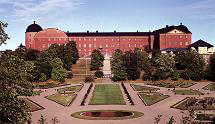Speaker
Paul Indelicato
(Université Pierre et Marie Curie, Paris)
Description
The Einstein classical Weak Equivalence Principle states that the trajectory of a particle is independent of its composition and internal structure when it is only submitted to gravitational forces. This fundamental principle has never been directly tested with antimatter. However, theoretical models such as supergravity may contain components inducing repulsive gravity thus violating this principle. The GBAR project (Gravitational Behaviour of Antihydrogen at Rest), accepted at CERN, proposes to measure the free fall acceleration of ultracold neutral antihydrogen atoms in the terrestrial gravitational field. The experiment consists in preparing antihydrogen ions (one antiproton and two positrons) and sympathetically cool them with Be+ ions to a few 10 mK. The ultracold ions will then be photo-ionized just above threshold, and the free-fall time over a known distance measured. I will describe the project, the accuracy that can be reached by standard techniques, and discuss possible improvements using quantum reflection of antihydrogen on surfaces to use quantum methods of measurements.
Primary author
Paul Indelicato
(Université Pierre et Marie Curie, Paris)

